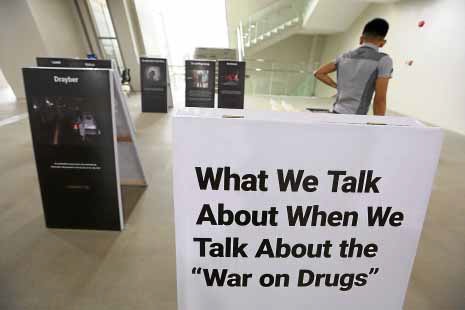Palace doubts study’s findings on drug war, use of news reports

DRUG WAR EXHIBIT A photo exhibit on the government’s war on drugs is mounted at Ateneo de Manila University’s George SK Ty Learning Innovation Wing as researchers disclose their findings during a press conference. —NIÑO JESUS ORBETA
Malacañang on Tuesday questioned the findings of an interuniversity study on President Rodrigo Duterte’s bloody war on drugs that were based on news reports.
The study, which was conducted by researchers from Ateneo de Manila University and De La Salle University, found that most of the victims in the war on drugs were poor males who were either killed in police operations or in attacks by unknown assailants.
Presidential spokesperson Harry Roque said he accepted the finding that most of the victims were poor, but he took exception to the study’s use of and reliance on secondary sources of information such as news reports.
“As to the victims, I won’t question that those killed are the poor. But the question here is, are they being killed because of the war on drugs?” Roque said in an interview on dzMM radio.
Independent verification
He said the researchers should have verified independently if those killed had links to the illegal drug trade, instead of heavily relying on news reports.
“They only accepted the data on those killed. But what could have been done is to check each case if those killed were killed because of the war on illegal drugs or for other reasons,” he said.
Presented to the public at Ateneo on Monday, the study counted 5,021 drug-related killings from May 2016 to September 2017.
The study found Metro Manila to be the top hot spot, accounting for 2,000 deaths, followed by Bulacan province, with 644.
In the National Capital Region, Manila had the most killings, with 463 deaths.
The Philippine National Police acknowledges only 3,987 killings from July 2016 to January 2018. It has counted only 2,235 drug-related homicide cases.
The researchers based their count on newspaper and television reports on the killings, which Roque found unacceptable.
“For me, there is no added value as to the use of secondary materials. I would expect these experts to use primary figures which are verified, and to arrive at a conclusion,” he said.
Check and balance
Ronald Mendoza, dean of Ateneo School of Governance, which spearheaded the research, acknowledged the shortcomings of a database built on media-vetted reports, but he said this nonetheless served as an important “check and balance” to a campaign against drugs where full transparency remained to be seen.
“[Secretary Roque] raises an important point that our study builds on media reports. It is incomplete and is not intended to be a count of total deaths but a dataset with information we can analyze for patterns,” Mendoza said.
He said the total death count was already “much larger than the 5,021 we already have so far,” and called on the Duterte administration to be more transparent in the drug war for the public to better grasp its magnitude.
In the two years since President Duterte launched his war on drugs, the PNP has released only aggregate figures on drug-related killings and operations.
The research team earlier said the lack of clear data “made it difficult to conduct an independent validation of the campaign’s effectiveness.”
“We very much welcome the opportunity to engage [the] government in an evidence-based discussion on the total count and context of the deaths of our citizens. For now, what we have is the most extensive media-vetted dataset on these killings,” Mendoza said.














